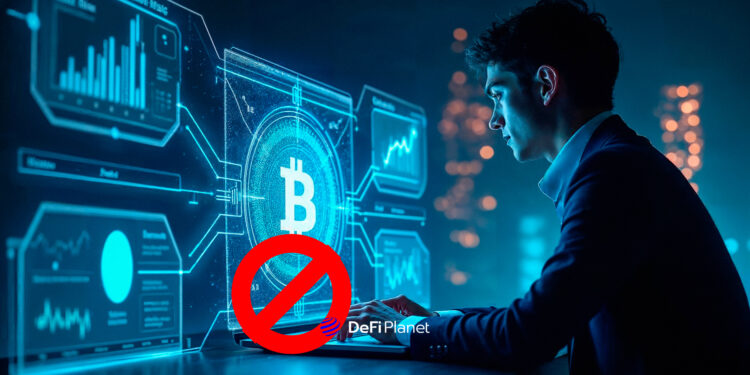Last updated on May 27th, 2025 at 12:50 pm
Blacklisting is quietly becoming a feature of DeFi—an ecosystem originally built to be trustless and permissionless. In theory, centralized authorities like banks and regulators were to play little or no role. In practice, the opposite seems to be happening.
Unlike traditional finance, where authorities can freeze accounts and restrict fund access, DeFi was designed to eliminate the need for intermediaries. Transactions are verified through cryptographic consensus, not institutional oversight.Yet, blacklisting—restricting specific wallet addresses from transacting—is increasingly used by governments, regulators, and centralized entities to combat fraud, money laundering, and sanctions violations.
In 2018, the United States Department of the Treasury’s Office of Foreign Assets Control (OFAC) added a number of Bitcoin addresses to its Specially Designated Nationals and Blocked Persons List (SDN List), effectively prohibiting any U.S. citizen from engaging with those addresses. Similarly, in August 2022, the U.S. Treasury blacklisted addresses linked to Tornado Cash, a decentralized mixing service designed to enhance transaction privacy, sparking widespread backlash in the crypto community. More recently, in January 2023, U.S. and European authorities took coordinated action against Bitzlato, a cryptocurrency exchange accused of processing $700 million in illicit funds.
Supporters argue that blacklisting enhances security, compliance, and opens doors for institutional adoption. But it raises a fundamental question: If centralized authorities can censor transactions, is the blockchain still trustless? And if these restrictions become routine, can DeFi still claim to be decentralized?
The Blurry Line Between Censorship Resistance and Control
DeFi’s biggest strength is its open-access design. Anyone with an internet connection can participate—no bank account, ID, or approval required. This has proven especially valuable for people in economically sanctioned or politically unstable regions.
But blacklisting introduces a selective gatekeeping mechanism. Though enforced in the name of security, it mirrors traditional finance’s top-down controls—recreating the same permission layers DeFi set out to dismantle.
Proponents argue that blacklisting improves compliance and makes DeFi palatable to institutions. That’s true to an extent. Institutional investors managing billions must follow strict legal guidelines. Without compliance frameworks, they risk fines, reputational damage, and legal exposure. So, measures like blacklisting, Know Your Customer (KYC) protocols, and Anti-Money Laundering (AML) procedures help reduce systemic risk.
In fact, some argue that without these controls, institutions will continue to see crypto as a Wild West—prone to scams, manipulation, and regulatory uncertainty. Blacklisting, then, becomes a stepping stone to mainstream legitimacy.
But this logic carries a tradeoff.
The Fungibility Problem
One of crypto’s core properties is fungibility: the idea that each token is interchangeable and indistinguishable from another of the same kind. Blacklisting disrupts this. Once an address is flagged, any tokens that pass through it become “tainted,” even if they later land in a wallet held by an unsuspecting user.
This creates a two-tiered system—clean coins and dirty coins. Over time, that undermines the credibility and usability of the token itself. Just as blacklisting can prevent criminals from cashing out, it can also wrongfully punish ordinary users who find themselves trapped in the blast radius of someone else’s bad behavior.

Arbitrary Power and Lack of Recourse
Another issue with blacklisting is how easily it can be misapplied. There’s often no formal review process or transparency around how addresses are chosen. Mistaken identity, algorithmic errors, or simple association with a flagged address can land someone on a blacklist, cutting them off from interacting with major DeFi protocols.
In most cases, there’s no appeals process, no court, no human review. A user’s financial freedom can be revoked by an opaque process, and the burden of proof falls on them—not the entity imposing the restriction. This places the burden of proof on individuals and not authorities, an approach that fundamentally is at variance with the principles of blockchain.
Legal Gray Areas and Global Fragmentation
Blacklisting also reveals a bigger issue—DeFi’s exposure to legal and jurisdictional gray zones. What one country considers illegal may be fully acceptable in another. Crypto operates on a borderless network, but blacklists are enforced based on local laws and politics. This can lead to inconsistencies where a wallet banned in the U.S. remains active elsewhere, or vice versa.
And while governments like the U.S. have taken the lead, other jurisdictions—like the EU, China, or even certain African nations—are implementing very different frameworks. For developers and platforms, this raises major questions about compliance. Which laws apply? Who decides what constitutes a sanctionable offense? And how should protocols respond when governments disagree?
This fragmentation increases operational risk and can make the entire ecosystem more fragile, especially if protocols are pressured to build different versions of their services to comply with local demands.
Can Blacklisting and DeFi Coexist?
This tension raises a crucial question: can blacklisting coexist with DeFi’s foundational principles?
On one side, there’s the argument that restricting wallets tied to criminal activity enhances security and makes the system safer for everyone. On the other side, it threatens decentralization and puts control into the hands of a few entities, many of whom can act unilaterally.
This has led to what some call the “decentralization illusion.” Platforms may appear decentralized on the surface but still rely on centralized tools, like front-end interfaces or governance protocols, to enforce blacklists. Behind the curtain, certain actors still wield power to dictate who gets access and who doesn’t.
So if blacklisting gets more normalized, DeFi could morph into a hybrid system—part permissionless, part regulated. Institutional capital may benefit from this shift, while crypto purists may migrate to newer technologies designed to preserve anonymity and censorship resistance.
Privacy-focused solutions like zero-knowledge proofs, decentralized identity (DID), and self-custody wallets may gain traction as users look for ways to protect autonomy without sacrificing compliance altogether.
It is worth noting there could be another way out as there are many new protocols experimenting with on-chain reputation systems, selective disclosure, and encrypted credentials to strike a balance between regulation and privacy.
Final Thoughts
Blacklisting represents one of the biggest philosophical challenges for DeFi: the tradeoff between regulation and freedom, between safety and self-sovereignty.
On one side are regulators and institutions demanding oversight. On the other are users who fear creeping centralization and the return of gatekeepers. In between lie developers and protocols trying to navigate a complex and often contradictory environment.
The long-term impact of blacklisting in crypto will depend on how regulators, developers, and the broader community balance security with decentralization. Governments and regulators are more likely to support crypto adoption if they see effective mechanisms that prevent illicit transactions and provide financial oversight. However, preserving blockchain’s core values while meeting institutional demands will require innovative regulatory approaches and technological solutions that respect user autonomy while safeguarding the financial ecosystem.
RELATED: Should DeFi Be Regulated?
So, the future of DeFi may not be purely permissionless or entirely regulated—but something in between. The question is whether that middle ground can preserve the values that made DeFi revolutionary in the first place.
Disclaimer: This piece is intended solely for informational purposes and should not be considered trading or investment advice. Nothing herein should be construed as financial, legal, or tax advice. Trading or investing in cryptocurrencies carries a considerable risk of financial loss. Always conduct due diligence.
If you would like to read more articles like this, visit DeFi Planet and follow us on Twitter, LinkedIn, Facebook, Instagram, and CoinMarketCap Community.
Take control of your crypto portfolio with MARKETS PRO, DeFi Planet’s suite of analytics tools.”





















